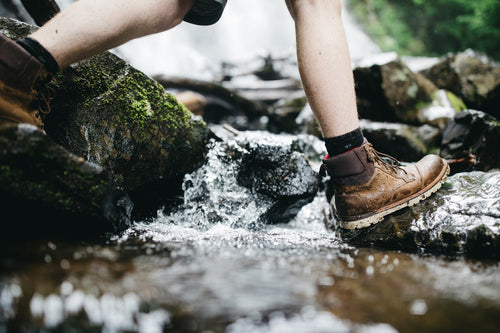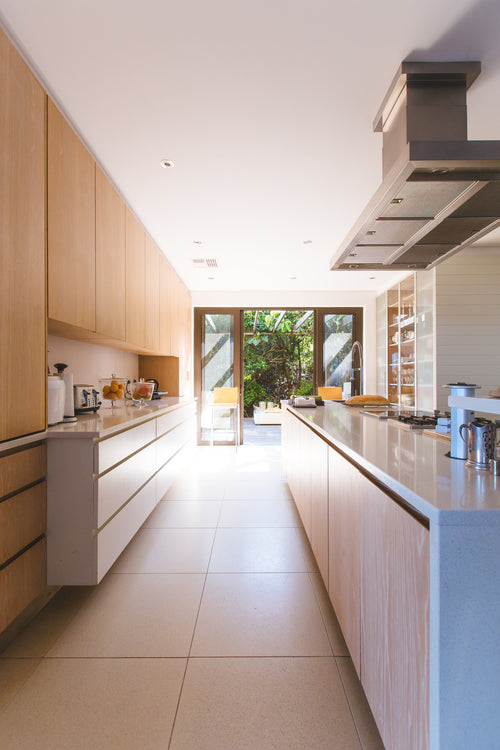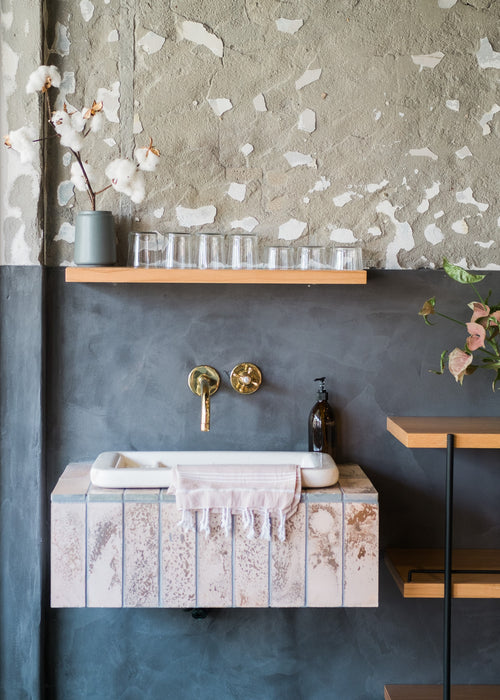HOW TO PREVENT SOAP SCUM ON YOUR BLACK BATHROOM COUNTERTOPS

Bathroom counters should be both beautiful and useful. One thing that can leave your countertops looking dirty and grimy is soap scum—and it’s particularly noticeable on black countertops. Black is one of the most popular bathroom countertop colors due to its elegant and sleek appearance.
Fortunately, there are ways to prevent the buildup of soap scum and keep your black bathroom countertops looking like new. Here’s what you need to know.
HOW IS SOAP SCUM CREATED IN THE FIRST PLACE?
Despite its name, soap scum is not really caused by soap. It’s more common in homes with hard water – meaning water with a high percentage of dissolved minerals such as calcium and magnesium.
Soap scum is the result of your soap mixing with mineral ions in your water. It can adhere to any surface in your home where you use soap and water, including your bathroom countertops, sinks, showers, bathtubs. It gives surfaces a dull, scaly appearance and is a magnet for mold and mildew, which adhere to it easily.
That might be gross enough on its own, but it’s common for soap scum in sinks and tubs to contain body oils, dead skin, and hair, as well as any dirt that might be floating around in your tub and sink. In other words, it’s not just unattractive, it’s unsanitary, too.
Black bathroom countertops are often made of natural stones such as granite and marble. However, soap scum can also form on many other surfaces that are commonly used in bathrooms and kitchens, including:
-
Ceramic tile
-
Porcelain
-
Plastic
-
Brass, nickel or other metal fixtures
If you want your bathroom countertops to stay looking as good as they did the day you installed them, it’s essential to find a way to prevent soap scum from forming in the first place.
HOW TO PREVENT THE FORMATION OF SOAP SCUM
There are some key steps you can take to prevent soap scum from forming on your bathroom countertops. Some start with treating the water while others are about protecting your countertops directly.
-
Install a water filtration system. Water filtration systems can help to filter out some of the mineral ions that cause soap scum, including magnesium and calcium. This is the most expensive option, but it can reduce the likelihood of soap scum forming on your bathroom countertops.
-
Clean your countertops daily by wiping them down, removing water, soap, and biological components such as skin and hair. This option is inexpensive but time-consuming because you’ll need to clean daily for it to work.
-
Treat your countertops with a protectant that will prevent soap scum from attaching to your countertops. The right product will seal your granite, marble or tile countertops and make it virtually impossible for soap scum to stick to them. A simple wipe-down will be all you need to keep your countertops looking beautiful.
HOW TO USE SIMPLECOAT TO PROTECT AGAINST SOAP SCUM
SimpleCoat is the simplest way to protect your bathroom countertops from soap scum. You can do it in just three easy steps:
-
Clean your bathroom countertops thoroughly with a soap scum remover. This is an essential step because you want to seal your countertops while they’re clean. We suggest using a combination of mild dish soap, water, and vinegar to cut through accumulated soap scum and clean your countertops. A medium-bristle brush can help remove soap scum without damaging your countertops, tiles or fixtures.
-
Put a small amount of SimpleCoat on a clean cloth and wipe it over your countertops to treat and seal them.
-
Wipe off any excess SimpleCoat and you’re done!
SimpleCoat is pet-safe, family-safe and completely nontoxic. That means you can use it on surfaces in your bathroom, kitchen, and anywhere in your house without worrying that it will harm any of the people or animals you love.
Once you have applied SimpleCoat, your countertops will be protected and simply wiping them will be enough to prevent the formation of any new soap scum. You should reapply SimpleCoat as needed (once a month to once a week, depending on how much use your bathroom gets) to keep your countertops and fixtures looking beautiful and new. Because SimpleCoat can make surfaces feel slightly slippery, we don’t recommend applying it on floors or bathroom safety handles/grab bars.
With SimpleCoat, soap scum can be a thing of the past. You’ll be able to enjoy your black bathroom countertops— and any other surfaces in your home—without the drudgery of daily cleaning.



